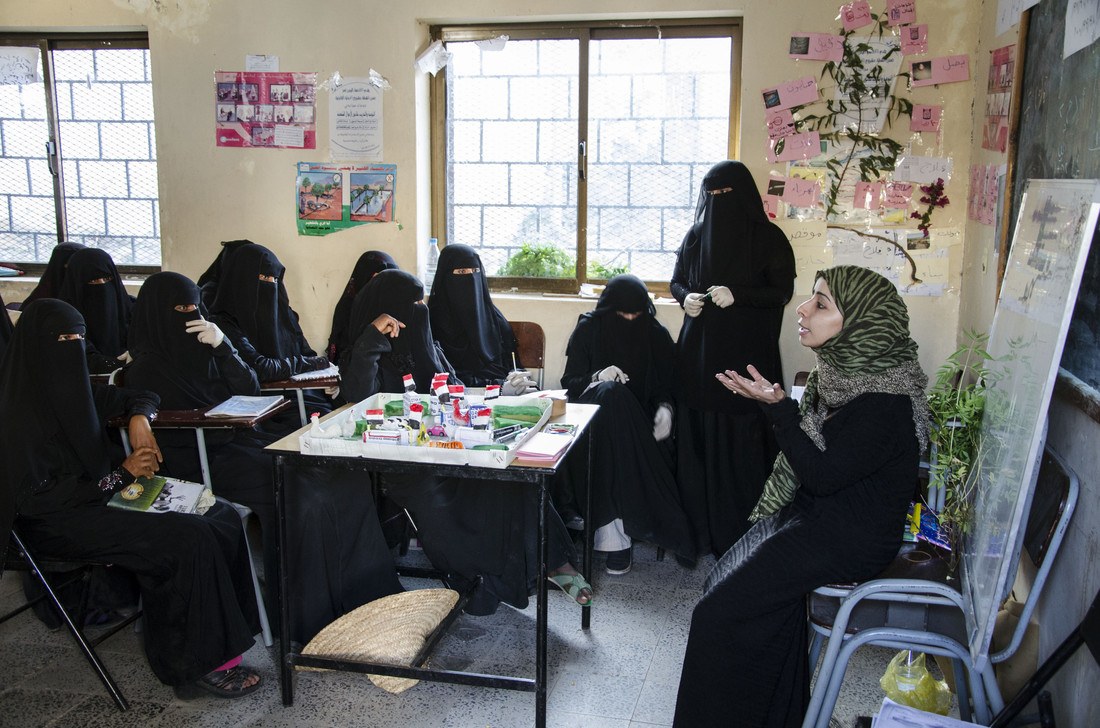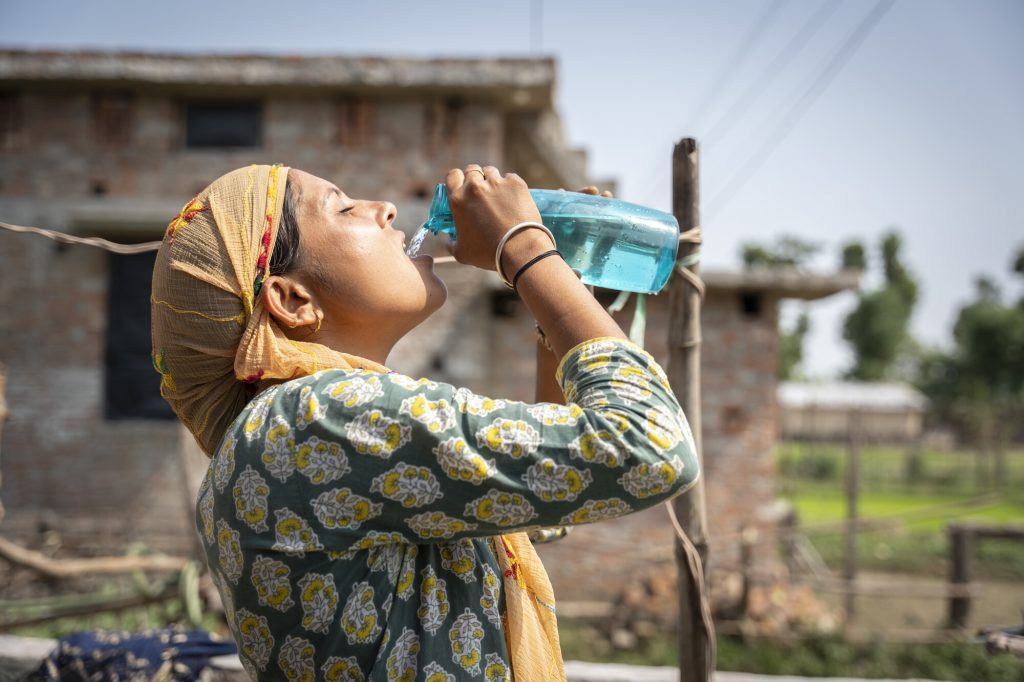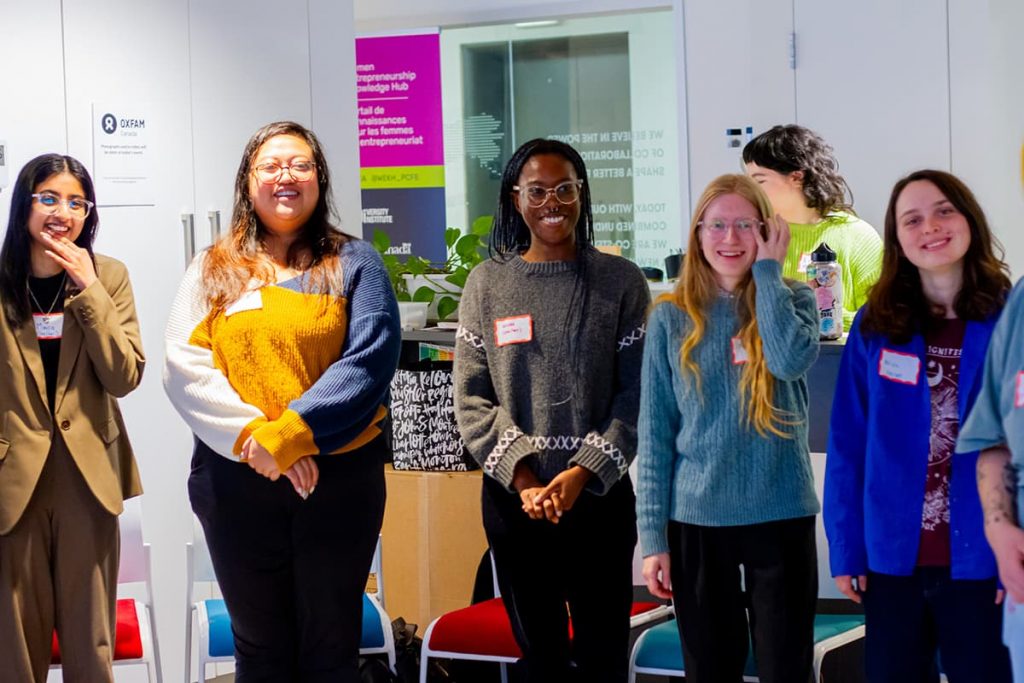7 things to know about Yemen
Women, men and children in Yemen are suffering because of a war with no end in sight. Parties to the conflict, including the Saudi-led coalition, are routinely violating international humanitarian law, which is why Canada should stop fuelling the war and immediately cancel its arms deal with Saudi Arabia.
The four-year conflict is causing the world’s largest humanitarian disaster – 80 per cent of Yemen’s population now need humanitarian assistance and protection. As the war rages on, cholera outbreaks, malnutrition, starvation and widespread suffering continue unabated.
Women suffer the most from the violence, but they are not passive victims of this devastating war. Yemeni women continue to demonstrate their resilience, working on the front lines of a brutal conflict to bring sustainable peace.
Here are seven things you should know about Yemen and Oxfam’s response to the crisis:
1. Civilians are targets.
Hunger is being used as a weapon of war. Belligerent parties are deliberately restricting access to food through blockades and import restrictions. Adding to the scarcity issue, the cost of basic food items has increased by 102% since the beginning of the war, making it extremely challenging for Yemenis to purchase enough to eat on a daily basis. As a result, 85,000 children under five have starved to death and nearly half of all children aged between six months and five years are chronically malnourished.
Attacks on schools, hospitals, weddings and markets remain a regular occurrence in Yemen. More than one third of all airstrikes by the Saudi-led coalition target non-military sites, and have led to at least 17,900 civilian causalities. The destruction of infrastructure and a lack of basic services make survival a painful struggle for millions.
In the midst of the war, Yemen is also facing one of the world’s worst ever cholera outbreaks. More than 40,000 people are believed to have the disease and many more are at risk, weakened by hunger and the effects of the ongoing war.
The conflict between the Saudi-led coalition and the Houthi rebels has left more than 24 million people – 80 per cent of Yemen's population – in dire need of emergency assistance, and it has forced over 3 million people from their homes.
2. Women and children are hardest hit.
Even before the escalation of the conflict in 2015, Yemen ranked poorly on most social development indicators. It also placed last in the Gender Gap Index. The ongoing war has exacerbated steep gender inequality and erased many gains obtained by the women’s movement following the 2011 uprisings.
The war disproportionately impacts women and, according to UNDP, has set back development by 21 years. In fact, more than one million pregnant or breastfeeding women are acutely malnourished and incidents of gender-based violence have increased by more than 63 per cent since the start of the conflict.
Earlier this spring, Oxfam Canada launched the English edition of The Women of Sheba: Stories of Resilience in Yemen, a graphic novel highlighting the realities women face on a daily basis.
You can read it here.
3. Canada is allowing the war to continue.
Canada is selling weapons to Saudi Arabia, one of the warring parties in Yemen. Canada should cancel its arms deal immediately and pressure all belligerent parties to genuinely engage in the peace process to bring the widespread suffering to an end.
Use your voice to demand that the Canadian government immediately cancel its arms deal with Saudi Arabia. Sign our petition here.
4. A ceasefire is urgent.
Maintaining and expanding the ceasefire in and around Hudaydah is vital to millions of people who are struggling to survive. Yemenis desperately need all parties to the conflict to agree to an immediate countrywide ceasefire and negotiate a lasting peace deal.
The pursuit of peace needs to be an inclusive political process, and Yemeni women, youth and civil society organizations from across the country should be actively involved.
5. Women are leading the peace efforts.
Yemeni women are leading humanitarian and peacebuilding efforts at the community level. Women are delivering food and water, tending to the wounded, securing safe passage for humanitarian aid and helping with the release of detainees. They have also put forth recommendations for a sustainable peace process.
Oxfam advocates for women to participate in peace processes in a meaningful way and regularly supports Yemeni women human rights defenders to access key international decision-making spaces.

6. Oxfam is on the ground.
Oxfam has been in Yemen for more than 30 years, working with government authorities, as well as civil society organizations, to improve water and sanitation services, and support the livelihoods of thousands of people living in poverty. Since the beginning of the war, we have reached more than 3 million people with urgent humanitarian assistance.
Our efforts include providing water, preventing cholera and repairing water systems. Find out more about our response here.
7. We work with local partners in all areas of our response in Yemen.
Oxfam joined forces with local Yemeni organizations, delivering clean water, distributing hygiene materials like soap, educating households about cholera prevention, and helping families get access to the money they need for essentials. We do not treat partners as contractors or service providers, we invest in them! Oxfam provides training in humanitarian work and capacity-building.
Oxfam also partners with local organizations to campaign for an end to the conflict and an inclusive peace agreement. In June 2019, we brought Yemeni partners to the 2019 Women Deliver Conference, the world's largest conference on gender equality and the health, rights, and well-being of girls and women. This created a space for them to share the realities of the war in Yemen and to advocate for long-term solutions to the conflict.

